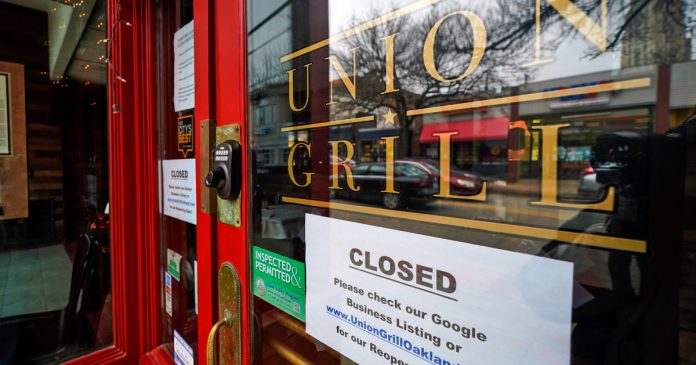[ad_1]
Surging COVID-19 infections and restrictions in December slammed the brakes on the engine of the US economy – consumer spending – for the second consecutive month.
Business-sapping restrictions designed to contain spiralling COVID-19 infections slammed the brakes on the engine of the United States economy in December, as consumers kept their wallets snapped shut and hunkered down at home.
Consumer spending, which drives roughly two-thirds of US economic growth, fell by $27.9bn or 0.2 percent in December, marking the second straight month of decline, the US Department of Commerce said on Friday.
In November, consumer spending fell 0.7 percent.
Friday’s data adds to a growing list of indicators that show the US economic recovery slowed considerably in December as the pandemic threw up fresh challenges to shopping, going to restaurants and travelling – all industries hit especially hard by COVID-19.
US gross domestic product (GDP) – which measures the total output of goods and services in the economy – grew a weaker-than-expected 4 percent on an annualised basis in the final three months of 2020, the Commerce Department said on Thursday.
For the year, the US economy contracted 3.5 percent in 2020 – the worst decline in GDP since 1946.
The economy lost 140,000 jobs in December, bringing seven straight months of jobs creation to a halt. Layoffs remain widespread, with some 847,000 Americans filing for unemployment benefits with states last week.
On Wednesday, Federal Reserve Chairman Jerome Powell explicitly linked progress on coronavirus vaccination drives with returning the economy to full health.
“There’s nothing more important to the economy than people getting vaccinated,” Powell said, adding that he has received one COVID-19 jab and expects to get a second one soon.
Many economists are expecting the economy to pick up later this year in anticipation that vaccine drives and a new round of virus relief aid from Congress will speed up a return to business as usual.
US President Joe Biden has proposed his American Rescue Plan – a new, massive $1.9 trillion stimulus package to accelerate the nation’s vaccine drive, and give more financial help to struggling households, small businesses and low-income and minority communities that have borne the brunt of the pandemic’s economic fallout.
Many analysts expect horse-trading between Democrats and Republicans in Congress to chip away at that price tag, but still see a significant kick-start in the cards.
“We assume that a $1.3tn fiscal stimulus package will emerge from the announced $1.9tn ARP, providing a near-immediate $1tn lift to household disposable income – with lower- to middle-income families benefiting from a new round of checks, expanded unemployment benefits, and other measures,” Oxford Economics wrote in a note to clients.
[ad_2]
Source link











